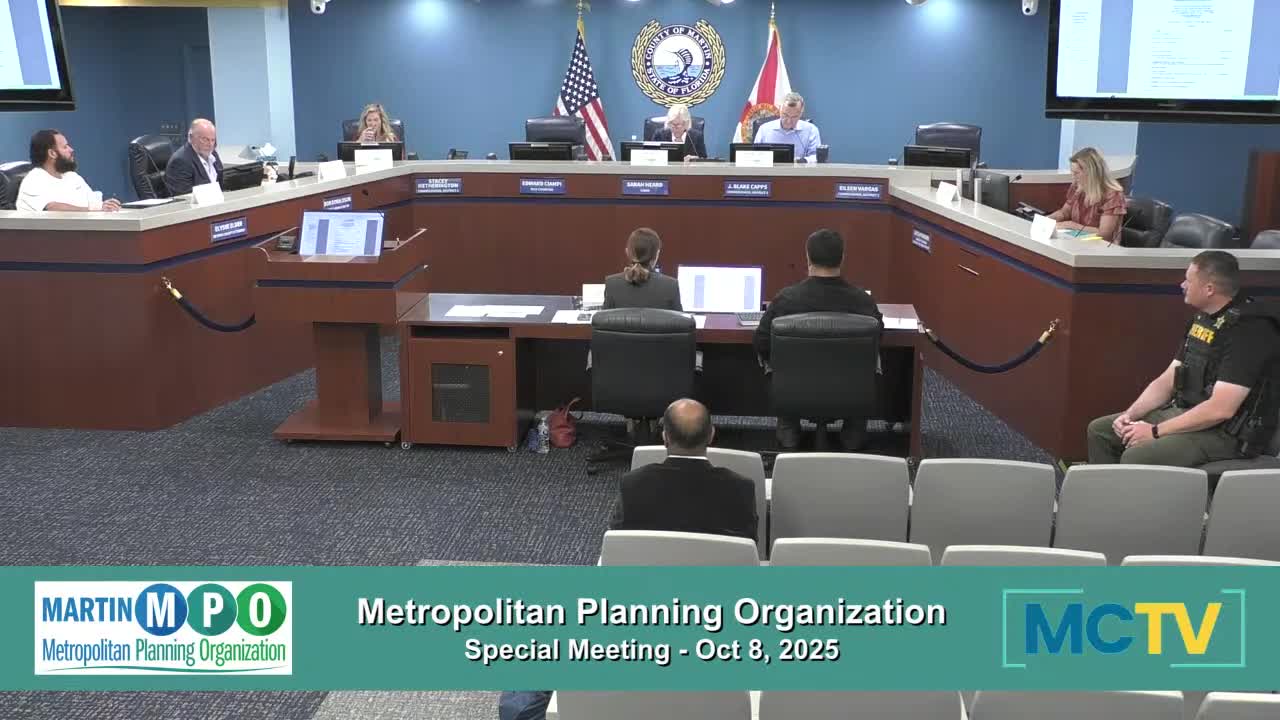Martin County MPO adopts 2050 long-range transportation plan after debate over regional service and technology scenarios
Get AI-powered insights, summaries, and transcripts
Subscribe
Summary
The Martin County Metropolitan Planning Organization voted 5-1 to adopt a $746 million 2050 Long Range Transportation Plan that includes roadway, transit and nonmotorized projects and presents two scenario analyses — regional transit connections and technology-led smart mobility futures.
The Martin County Metropolitan Planning Organization voted 5-1 to adopt the 2050 Long Range Transportation Plan, approving a roughly $746 million, multiyear package of roadway, transit and nonmotorized projects through midcentury.
The plan is the result of nearly two years of work by MPO staff and consultants and includes a cost-feasible project list, scenario analyses and supporting technical documents that make the MPO eligible to receive federal and state transportation funding.
Vikas Jain, project manager with T.Y. Lin, told the board the draft “is about $746,000,000 in year of expenditure dollars.” The plan includes about $45,000,000 in projects listed as illustrative — projects that depend on competitive or discretionary funding — and allocates about 69% of funds to roadway/highway improvements and about 22% to transit, with the remainder for other modes.
Board members and staff framed the adoption as a compliance step required to access state and federal funds. Beth, the MPO chair (name provided in the meeting), said the plan must be consistent with local comprehensive plans and federal/state requirements. She noted FDOT District Secretary Steve Braun will attend the next MPO meeting Oct. 27 and said the department has “some really good news” related to State Road 710 funding.
The consultant presented two analytical scenarios evaluated against the cost-feasible plan. The “regional connections” scenario layered five regional transit routes and highway connections — including a Tri-Rail extension concept along the FEC corridor, a CSX connector in the SR 710 corridor, express bus service on the Turnpike and I‑95, and US‑1 transit enhancements — on top of the adopted project list. The “smart mobility futures” scenario modeled a technology-driven future with modest autonomous-vehicle penetration, connected-vehicle improvements, micromobility and mobility-as-a-service elements (evaluated qualitatively where the regional travel model could not capture them).
“The regional connections scenario shows higher vehicle miles traveled — about 4.5% more than the cost-feasible plan,” Jain said. “Smart mobility futures is about 3.5% more.” Jain also reported that regional transit service produced the largest increase in daily transit ridership, while smart mobility futures produced modest reductions in transit ridership because of improved travel speeds and travel-time advantages for other modes. Energy-cost estimates were highest for the regional-connections scenario and roughly in line for the smart-mobility scenario compared with the draft cost-feasible plan.
Board members asked about the feasibility and timeline of a Tri‑Rail extension. The board noted that studies and earlier legislative actions have shaped the project’s prospects but that no local timetable was provided during the meeting. The MPO staff and consultant emphasized that the scenario analyses were an analytical exercise and would not change the project list contained in the adopted LRTP unless board members pursued an amendment through the MPO’s formal amendment process.
A roll-call vote recorded the following: Commissioner Sarah Hood — approve; Commissioner Stacy Hetherington — approve; Commissioner Jake Blake Capps — approve; Mayor Carmine DeParle — approve; Commissioner Sean Reid — no. Commissioners Eileen Vargas, Edward Campe and Kaya Mayfield were excused. The motion to adopt did not show named mover and seconder on the record.
Adoption places the MPO in compliance with federal and state requirements and allows the MPO to enter the production phase for reports and technical memoranda tied to the LRTP. Staff said the LRTP is updated every five years and can be amended between updates if local governments request changes; the MPO chair directed jurisdictions to submit letters if they wanted to pursue amendments.
The board scheduled the next MPO meeting for Oct. 27, when FDOT officials will present updates on State Road 710 funding.
